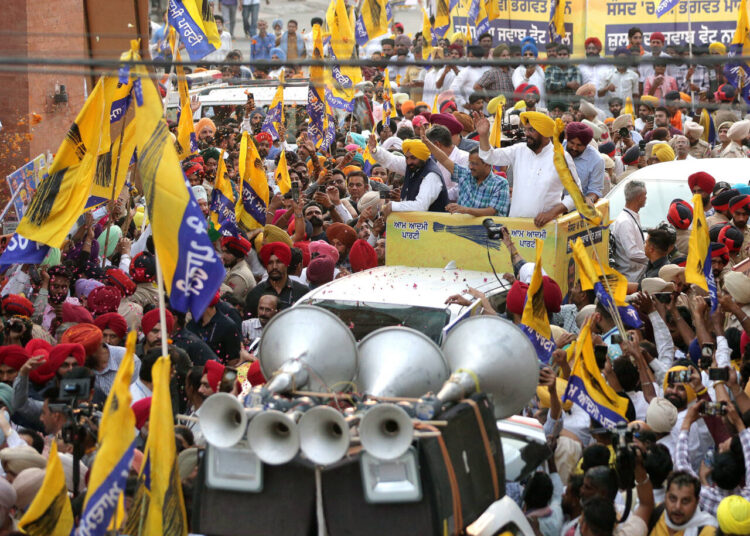All 13 of Punjab’s Lok Sabha seats will be contested in the seventh and final phase of polling on June 1, with the farm crisis emerging as a central issue. The ruling Aam Aadmi Party (AAP) is contesting independently, despite forming alliances with the Congress in neighboring Haryana and Delhi. As Punjab braces for a four-cornered contest, several key questions loom large over the 2024 elections.
Challenges ahead of BJP
The Bharatiya Janata Party (BJP) is grappling with significant opposition from farm unions, which have disrupted its campaign and called for a boycott of its candidates. This poses a severe challenge to the BJP’s rural outreach, crucial as it contests alone in Punjab for the first time since 1996. Historically reliant on the Shiromani Akali Dal (SAD) for rural votes, the BJP must now expand its base beyond Hindu-dominated urban areas. The farmers’ backlash also undermines the party’s efforts to integrate Sikh leaders, mainly defectors from the Congress, who are running in six of the 13 seats.
BJP’s Urban Strategy
The BJP is contesting all 13 seats for the first time since ending its alliance with SAD over the now-repealed farm laws. In 2019, the party secured two of the three seats it contested. This election, it relies on Prime Minister Narendra Modi and the Ram temple issue to garner support. However, past elections showed limited success from the Modi factor for the SAD-BJP alliance. Facing rural backlash, the BJP hopes to galvanize urban voters, but it remains uncertain if it can overcome its “Brahmin-Bania” party image and make rural inroads.
AAP’s Foothold
AAP, which swept to power in 2022 with 92 of 117 assembly seats, is in a favorable position but faces stiff competition from the Congress in at least 10 of the 13 seats. AAP banks on populist measures like free power, Chief Minister Bhagwant Mann’s clean image, and a relatable campaign. Although AAP may not replicate its 42% vote share from the assembly polls, it is poised to be a significant contender.
Congress and Akalis’ Comeback Bid
The parliamentary elections offer a chance for both the Congress and Akalis to recover from their 2022 assembly debacles. Congress, which won eight seats with a 40.12% vote share in 2019 but secured only 18 of 117 assembly seats last year, is betting on anti-incumbency against AAP, Rahul Gandhi’s anti-BJP stance, and prominent leaders like Charanjit Channi. Despite defections, Congress appears resurgent. Meanwhile, the Akalis, whose vote share dropped to 18.38% in 2022, are returning to their religious roots to regain Sikh support and placate farmers, but their struggles may persist.
Amritpal Singh’s Candidature:
There is no significant resurgence of Pro-Separatist sentiment, even with radical Sikh leader Amritpal Singh, detained in Assam, announcing his independent run from Khadoor Sahib. His campaign, managed by his parents and supporters, focuses on his anti-drug stance and Sikh preaching. His candidacy could moderate his image rather than revive separatist voices. Only Simranjit Singh Mann, a known sympathizer, has supported Amritpal Singh.
As Punjab heads into the final phase of the Lok Sabha elections, these dynamics will play a crucial role in shaping the outcome in the state.

















Comments